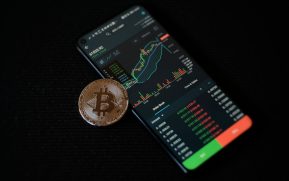
This is a carousel. Use Next and Previous buttons to navigate
Bitcoin tokens are symbolic since the cryptocurrency itself really exists only digitally. (Dan Kitwood/Getty Images/TNS)
Business consultants love the trope that those who got rich from the California Goldrush were not the miners, but the shopkeepers who sold picks and shovels. Another group got rich, though, and that’s the grifters.
Determining who is who is tough in the fracas surrounding the cryptocurrency gold rush but be sure all the familiar characters are involved.
Millions of people are losing billions of dollars following the collapse of the cryptocurrency exchange FTX and the other firms falling like dominoes behind it. While the technology may be new, this story follows the outline of every other get-rich-quick scheme.
Early movers made serious coin, greenhorns piled in, and opportunists fleeced the newbies.
I’ve always admired blockchain technology’s promise of an immutable ledger of ownership rights. Imagine a global accounting system that makes embezzlement and expropriation impossible, and you see blockchain’s potential.
What I’ve always doubted, though, was blockchain’s premier application to create digital currencies, such as Bitcoin, Ethereum and Doge. These digital coins have no physical substance and only have value in people’s imaginations, and as we all know, people are fickle.
Today, millions of people believe Bitcoin is worth about $16,200, Ethereum is $1,170, and Doge is 9 cents. But at their all-time highs, Bitcoin was $63,800, Ethereum was $4,720, and Doge was an astonishing 69 cents, considering the founder started it as a joke.
Demand determines crypto’s exchange rate, which is why enthusiasts work so hard to convince the public (read: greenhorns) to buy in. If the same 190 million entities traded the same $318 billion of Bitcoin only among themselves, its value would remain relatively flat.
Wall Street wunderkind Sam Bankman-Fried founded Alameda Research to make money trading crypto, but he, like many others, recognized that managing a digital wallet and conducting trades on the blockchain was too difficult for the average Josephine. So he founded FTX to make holding and trading crypto much simpler.
Every new dollar converted into crypto raises its exchange rate, allowing early movers to cash out their winnings. The insane profits encouraged more people to exchange their hard currencies for crypto.
FTX soon allowed users to park their crypto in interest-earning accounts. While a bank’s savings account yielded 0.25 percent interest, FTX promised 8 percent.
Bankman-Fried said Alameda and FTX operated as two different businesses. Alameda metaphorically worked the mines, while FTZ leased picks and shovels. Playing both sides sounded like hedging your bets, but it was not that simple.
Bankman-Fried said he could pay such high returns because FTX was trading on volatility and disparities in crypto’s global, 24-hour markets. While that was true for a while, it didn’t last.
Crypto’s value relies on more money coming in than going out. When central banks began raising interest rates, and stock prices dropped, people started pulling out their money. Exchange rates dropped, and Alameda got into trouble. Bankman-Fried moved the greenhorn’s money into Alameda’s accounts.
Bankman-Fried’s explanation in an interview with Vox news is not reassuring.
“Most exchanges did some variant of what we did — just not as big and without the run on the bank,” he said. “Everyone wants to be clever, and the clever thing to do is some complicated 3-D chess involving customer orders or data or something like that which makes no actual sense.”
Bankman-Fried likes to compare what happened at FTX to the bank runs in the 1930s that worsened the Great Depression. Others have compared crypto-exchanges like FTX to Ponzi schemes, where early investors are paid off with late investors’ money until the bubble pops.
Was Bankman-Fried grifting or selling sub-par shovels?
Investigators, prosecutors and judges will need years to make that determination. Almost non-existent regulation may make criminal charges challenging to pursue. But one thing is sure, account holders’ and investors’ money is gone, hence, the house of cards effect.
Crypto-lender BlockFi’s bankruptcy on Monday is the latest example of a firm collapsing due to FTX. But even companies without direct exposure are suffering.
FTX competitor Coinbase’s market value has dropped from more than $70 billion last year to $10 billion. In the past week, traders have pulled $3.5 billion out of Bitcoin. The more the FTX contagion spreads, the faster investors are cashing out of all crypto-related offerings.
This year’s bankruptcies demonstrate how tech-minded libertarians, crypto-evangelists and criminal networks can misuse blockchain technology. But that doesn’t mean blockchains or crypto are dead, only that investors should not consider bits of code to be appreciating asset.
A global, immutable money transfer system is a good idea, but treating cryptocurrencies like gold is not. Unless you are selling digital picks and shovels.
Chris Tomlinson, named 2021 columnist of the year by the Texas Managing Editors, writes commentary about money, politics and life in Texas. Sign up for his “Tomlinson’s Take” newsletter at HoustonChronicle.com/TomlinsonNewsletter.
twitter.com/cltomlinson
chris.tomlinson@chron.com
Chris Tomlinson has written commentary about money, politics and life in Texas for Hearst Newspapers since 2014. In 2021, the Texas Association of Managing Editors awarded him columnist of the year, and the Headliners Foundation named him Texas’s Star Opinion Writer. He’s authored two New York Times Bestsellers, “Forget the Alamo: The Rise and Fall of an American Myth” and “Tomlinson Hill: The Remarkable Story of Two Families Who Share the Tomlinson Name – One White, One Black.” Before joining the Houston Chronicle, he spent 20 years with The Associated Press reporting on politics, economics, conflicts and natural disasters from more than 30 countries in Africa, the Middle East and Europe.
As executives bask in the glow of short-term profits – much of them driven by Russia’s war against Ukraine – the oil industry faces the same long-term challenges that have threatened its future in recent years.
 How To Make Huge Profits In A Short Time With Crypto
How To Make Huge Profits In A Short Time With CryptoGet detailed training system that shows an absolute beginner (without any skill) how to make huge profits in a short time with crypto.
 Crypto + NFT Quick Start Course
Crypto + NFT Quick Start CourseThe #1 course for profit in the Crypto & NFT world - You will discover the secrets that 99% of people don’t know yet





